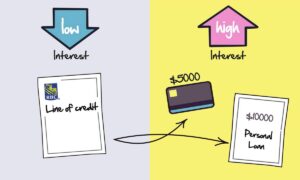You went from a crisis in which you had to borrow money from a friend to one in which you cannot repay the loan. After all, your pal stuck their neck out for you, and maybe even hurt their own pocket, to help you out of a jam.
You’re now faced with the real possibility that your relationship with your friend becomes damaged, even though you likely had every intention of timely repayment. In that case, you may be able to get a title loan for cash, or you can consider the following.
1. Don’t Run and Hide
Perhaps it’s human nature to want to avoid the person to whom you owe money, but truly, that’s the last thing you should do. Especially if you normally regularly see or talk to that friend, who now likely feels disrespected. Tell them you’re duly embarrassed and disappointed in yourself, but that you plan to make things right asap.
2. Don’t Take Them for Granted
Some people don’t fret much about debt repayment because they’re dealing with a friend – not a mortgage holder or credit card company, for example. So, they feel like they can take their time. That’s a poor attitude, and not only will you lose “credit” with this person, who undoubtedly will no longer lend to you, but you stand a good chance of really hurting the relationship.
3. Be Honest

Source: upjourney.com
If you want to maintain your relationship, you need to be upfront about what’s going on. It may be a tough conversation, but hey, you’re the one who borrowed the cash and failed to repay it as agreed, so you might have to endure a bit of discomfort.
Just do not make excuses or lie – most people who know you will pick up on that. That just exacerbates everything. If you lay yourself bare and be open and honest about your finances, your friend may be more forgiving about the situation. Especially if your financial woes are serious.
4. Communicate and Seek Understanding
When you find yourself unable to repay a loan from a friend, it is essential to prioritize open and honest communication. Taking the initiative to share your financial situation and the circumstances that led to this setback demonstrates sincerity and transparency.
By explaining any unexpected hardships or challenges, you provide your friend with a better understanding of the situation. Effective communication lays the foundation for rebuilding trust and maintaining a healthy relationship built on transparency, empathy, and mutual respect.
In having this conversation, it is crucial to approach it with humility and honesty. Express your genuine remorse for being unable to fulfill your financial obligation and assure your friend that you had every intention of repaying the loan. By acknowledging your responsibility and demonstrating a willingness to make things right, you convey your commitment to resolving the situation in a respectful manner.
5. Revise the Repayment Plan
Assure your friend that you are committed to paying off the debt and that you’d like to establish a new repayment schedule. Perhaps you could better handle installment payments. If your lender isn’t all that amenable, perhaps you can offer them something in exchange for the obligation, say electronics you own or a service you can provide, such as designing them a new website.
6. Explore Alternative Forms of Repayment

Source: peopleslawschool.ca
If traditional cash repayment is not feasible, it becomes crucial to explore alternative options with your friend to find a resolution that works for both parties. Show your commitment to finding a solution by offering to provide a service or favor in return for the debt.
Tailor the arrangement to meet their needs and preferences. This approach showcases your willingness to make amends and emphasizes your desire to find a mutually beneficial resolution.
Maintain open and respectful communication during negotiations, ensuring that both parties feel valued and heard throughout the process. Listen to your friend’s perspective and be open to finding a compromise that addresses their concerns while also considering your financial capabilities.
This collaborative approach demonstrates your commitment to finding a solution that respects their support and preserves the integrity of your relationship.
7. Tighten Your Belt
According to www.choicecash.com If you owe someone you see fairly regularly and they see you buying yourself discretionary items and not repaying them, that’s not a good look – at all. It’s disrespectful and tells the lender that they’re not that important. In fact, if you buckle down on your expenses, you might be able to repay your friend or relative sooner rather than later.
8. Handle the Fallout
You can’t get upset because your friend’s upset – it doesn’t work like that. They do have a right to feel irritated, or worse because they trusted you, but you didn’t come to hold up your end of the deal. They neither are required to treat you leniently nor should you expect them to simply forgive the debt. Even if you feel like, were the shoe on the other foot, you’d cut them slack, you must give them room to feel what they feel.
Your best bet is to be apologetic and redouble your efforts to pay the cashback. Remember, your relationship is at stake.
9. Seek Professional Advice if Needed

Source: debt.com
When facing overwhelming debts or complex financial challenges, seeking professional advice can provide invaluable guidance. Consider consulting a financial counselor or debt management professional who can assist you in creating a realistic repayment plan.
They can offer insights into effective budgeting, help prioritize your financial obligations, and provide strategies to regain stability. Taking proactive steps to address your financial health demonstrates your commitment to resolving the situation and rebuilding your financial future.
A financial counselor can review your overall financial situation, help you analyze your income, expenses, and debts, and develop a repayment plan that fits your current circumstances. They can also provide guidance on negotiating with your friend and exploring potential options to repay the loan over time.
Seeking professional advice shows your willingness to take responsibility for your financial situation and reinforces your commitment to finding a viable solution.
10. Learn from the Experience
Facing the consequences of an unpaid loan offers an opportunity for personal growth and improved financial responsibility. Reflect on the circumstances that led to this situation and identify areas where you can make positive changes. Invest in your financial literacy by educating yourself about budgeting, saving, and responsible borrowing.
Develop effective money management skills and explore strategies for building a solid financial foundation.
Consider participating in financial literacy programs or workshops to enhance your understanding of personal finance. Take the time to analyze your spending habits, identify areas where you can reduce expenses, and create a realistic budget that aligns with your financial capabilities.
This commitment to learning and growth demonstrates your determination to avoid similar situations in the future and establish a more secure financial future.
So, if you find yourself in the unfortunate situation of not being able to repay a loan from a friend or relative, you have some moves you can make to make things right.























